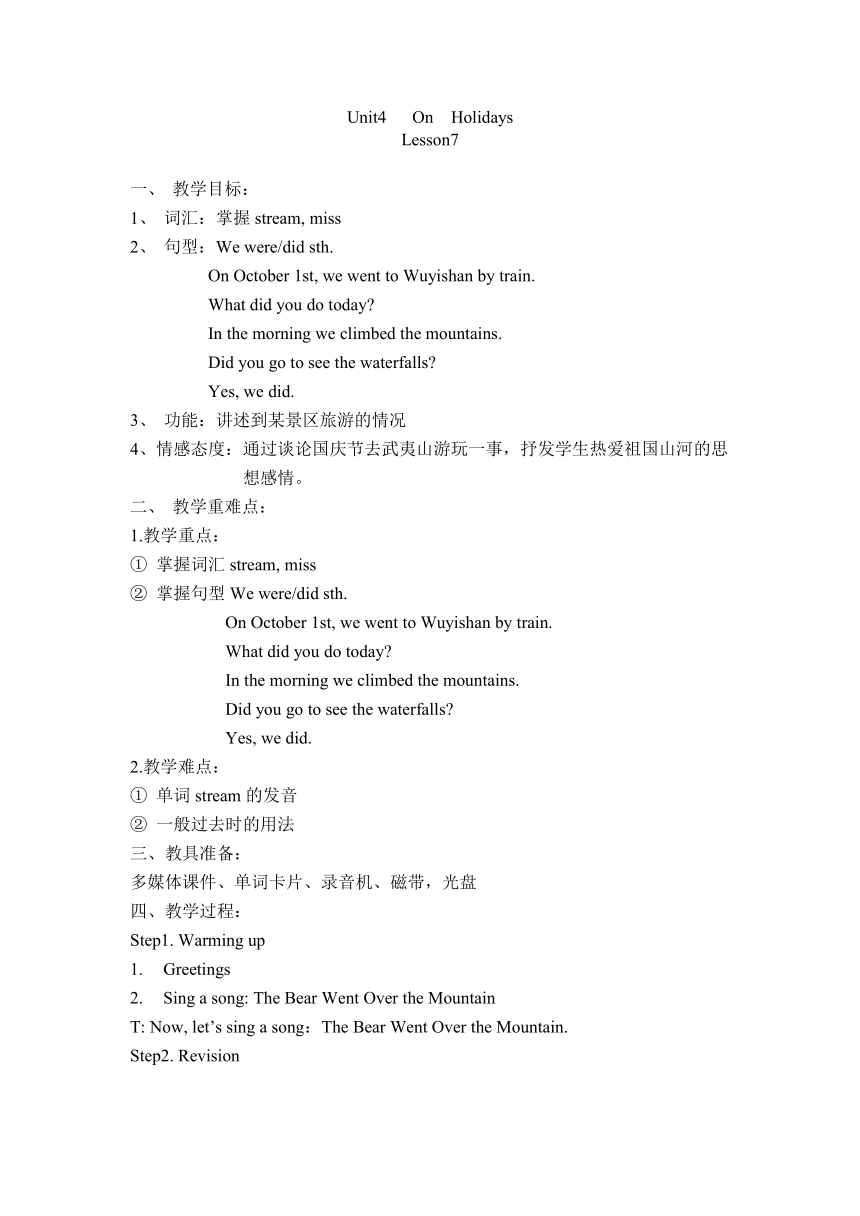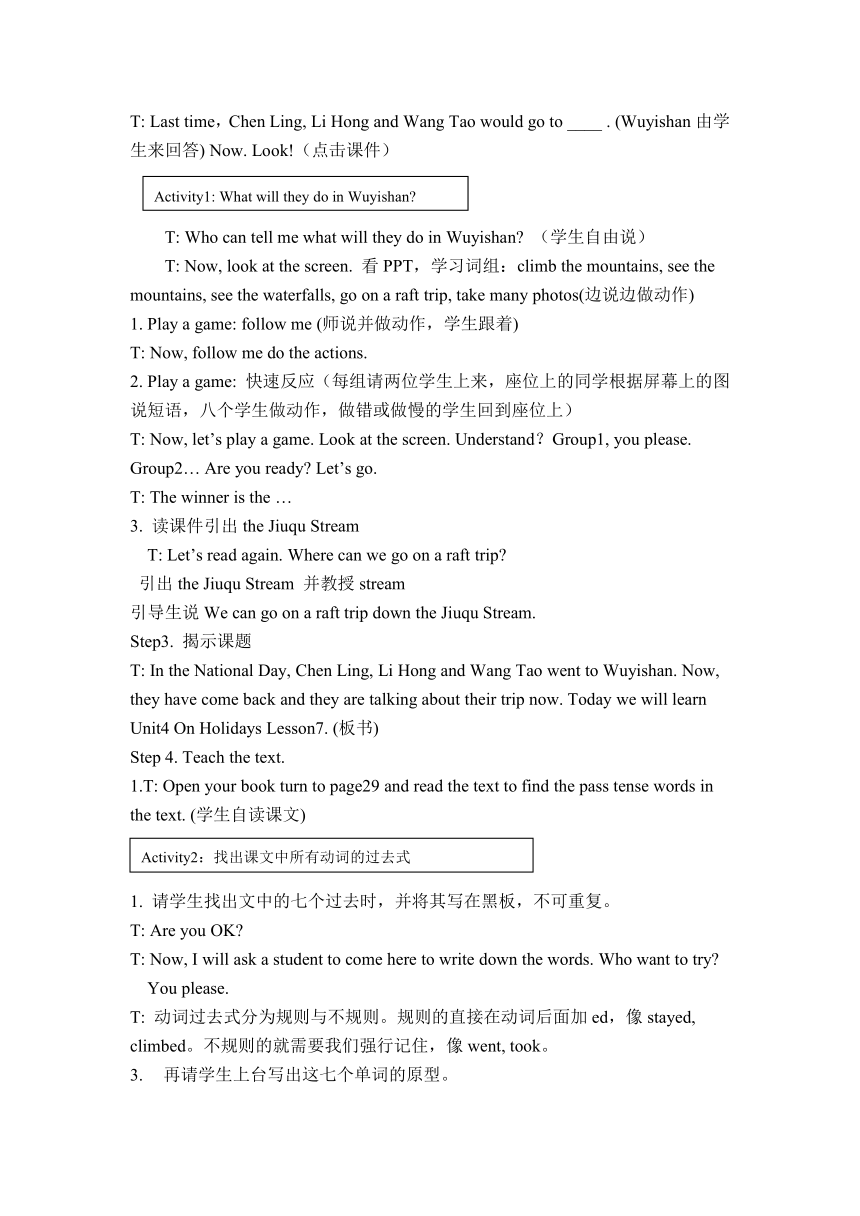六年级上 Unit4 On Holidays
文档属性
| 名称 | 六年级上 Unit4 On Holidays |

|
|
| 格式 | zip | ||
| 文件大小 | 13.7KB | ||
| 资源类型 | 教案 | ||
| 版本资源 | 闽教版 | ||
| 科目 | 英语 | ||
| 更新时间 | 2011-12-02 00:00:00 | ||
图片预览


文档简介
Unit4 On Holidays
Lesson7
一、 教学目标:
1、 词汇:掌握stream, miss
2、 句型:We were/did sth.
On October 1st, we went to Wuyishan by train.
What did you do today
In the morning we climbed the mountains.
Did you go to see the waterfalls
Yes, we did.
3、 功能:讲述到某景区旅游的情况
4、情感态度:通过谈论国庆节去武夷山游玩一事,抒发学生热爱祖国山河的思想感情。
二、 教学重难点:
1.教学重点:
① 掌握词汇stream, miss
② 掌握句型We were/did sth.
On October 1st, we went to Wuyishan by train.
What did you do today
In the morning we climbed the mountains.
Did you go to see the waterfalls
Yes, we did.
2.教学难点:
① 单词stream的发音
② 一般过去时的用法
三、教具准备:
多媒体课件、单词卡片、录音机、磁带,光盘
四、教学过程:
Step1. Warming up
1. Greetings
2. Sing a song: The Bear Went Over the Mountain
T: Now, let’s sing a song:The Bear Went Over the Mountain.
Step2. Revision
T: Last time,Chen Ling, Li Hong and Wang Tao would go to ____ . (Wuyishan由学生来回答) Now. Look!(点击课件)
T: Who can tell me what will they do in Wuyishan (学生自由说)
T: Now, look at the screen. 看PPT,学习词组:climb the mountains, see the mountains, see the waterfalls, go on a raft trip, take many photos(边说边做动作)
1. Play a game: follow me (师说并做动作,学生跟着)
T: Now, follow me do the actions.
2. Play a game: 快速反应(每组请两位学生上来,座位上的同学根据屏幕上的图说短语,八个学生做动作,做错或做慢的学生回到座位上)
T: Now, let’s play a game. Look at the screen. Understand?Group1, you please. Group2… Are you ready Let’s go.
T: The winner is the …
3. 读课件引出the Jiuqu Stream
T: Let’s read again. Where can we go on a raft trip
引出the Jiuqu Stream 并教授stream
引导生说We can go on a raft trip down the Jiuqu Stream.
Step3. 揭示课题
T: In the National Day, Chen Ling, Li Hong and Wang Tao went to Wuyishan. Now, they have come back and they are talking about their trip now. Today we will learn Unit4 On Holidays Lesson7. (板书)
Step 4. Teach the text.
1.T: Open your book turn to page29 and read the text to find the pass tense words in the text. (学生自读课文)
1. 请学生找出文中的七个过去时,并将其写在黑板,不可重复。
T: Are you OK
T: Now, I will ask a student to come here to write down the words. Who want to try
You please.
T: 动词过去式分为规则与不规则。规则的直接在动词后面加ed,像stayed, climbed。不规则的就需要我们强行记住,像went, took。
3. 再请学生上台写出这七个单词的原型。
T: Now, I will ask another one to write down their original forms. Who can try You please.
一一对应操练
T: Now, I point the words and you say them.
4. 教师解释这里为什么要用过去时,并与一般将来时will进行区别
T: Look at the screen, let’s read the sentence together. Very good. Now, look at this sentence, who can fill in the blank You please.
T: 第一句之所以用过去时是因为10月1日是过去的时间,表示事情已经过去。第二句用一般将来时是因为11月1日是将来的时间,表示事情还没有发生。它的动词形式是will+动词原型,而一般过去时我们要用动词的过去式 。
T: Now, read the text carefully to answer the four questions.
①How did they go to Wuyishan
②When did they go to Wuyishan
③Where did they stay
④What did they do on Oct. 2nd?在此教师解释时间短语的摆放位置,并说明短语后面的逗号可加可不加。(板书)
T: 这里时间短语可放前面也可放后面。我们可以说On Oct. 2nd, we climbed the mountains in the morning. 也可以说We climbed the mountains in the morning,on Oct. 2nd. 而且时间短语后面的逗号可加可不加。
2. 听录音跟读课文(前四句男女生跟读,后4句分组跟读)
T: Now, let’s listen to the tape and read after it.
Step5. Consolidation
1. 出示P30页的六幅图,进行听音标号。(图顺序打乱进行标号)
T: Now, look at the screen. Listen and number.
2. 教授单词miss
T: When Chen Ling was in Wuyishan, her father missed her. Now, look at the card. Miss(教授单词miss, 采用男女生,two by two, golden finger, 全班操练)
3. T: Her father missed her, so he called to her. And this is their dialog. Who can read 完了没有?没有。 OK, let’s do activity4 to finish this dialog. You should complete the dialog by using the sentences in the envelop.(点击PPT,出现对话的前4句,教师讲解并领读)
(学生两人一组,将所给句子按顺序贴在对话下面,然后汇报)
Step6. Sum up
T: 今天我们复习了一般过去时,它是用在事情已经发生,表示过去发生的事情。而一般将来时是表示事情还没发生,但将要发生。
五、Homework
T: This is today’s homework. Class is over. Goodbye boys and girls.
Activity1: What will they do in Wuyishan
Activity2:找出课文中所有动词的过去式
Activity3:根据课文内容回答下列问题
Activity4:续编对话
Lesson7
一、 教学目标:
1、 词汇:掌握stream, miss
2、 句型:We were/did sth.
On October 1st, we went to Wuyishan by train.
What did you do today
In the morning we climbed the mountains.
Did you go to see the waterfalls
Yes, we did.
3、 功能:讲述到某景区旅游的情况
4、情感态度:通过谈论国庆节去武夷山游玩一事,抒发学生热爱祖国山河的思想感情。
二、 教学重难点:
1.教学重点:
① 掌握词汇stream, miss
② 掌握句型We were/did sth.
On October 1st, we went to Wuyishan by train.
What did you do today
In the morning we climbed the mountains.
Did you go to see the waterfalls
Yes, we did.
2.教学难点:
① 单词stream的发音
② 一般过去时的用法
三、教具准备:
多媒体课件、单词卡片、录音机、磁带,光盘
四、教学过程:
Step1. Warming up
1. Greetings
2. Sing a song: The Bear Went Over the Mountain
T: Now, let’s sing a song:The Bear Went Over the Mountain.
Step2. Revision
T: Last time,Chen Ling, Li Hong and Wang Tao would go to ____ . (Wuyishan由学生来回答) Now. Look!(点击课件)
T: Who can tell me what will they do in Wuyishan (学生自由说)
T: Now, look at the screen. 看PPT,学习词组:climb the mountains, see the mountains, see the waterfalls, go on a raft trip, take many photos(边说边做动作)
1. Play a game: follow me (师说并做动作,学生跟着)
T: Now, follow me do the actions.
2. Play a game: 快速反应(每组请两位学生上来,座位上的同学根据屏幕上的图说短语,八个学生做动作,做错或做慢的学生回到座位上)
T: Now, let’s play a game. Look at the screen. Understand?Group1, you please. Group2… Are you ready Let’s go.
T: The winner is the …
3. 读课件引出the Jiuqu Stream
T: Let’s read again. Where can we go on a raft trip
引出the Jiuqu Stream 并教授stream
引导生说We can go on a raft trip down the Jiuqu Stream.
Step3. 揭示课题
T: In the National Day, Chen Ling, Li Hong and Wang Tao went to Wuyishan. Now, they have come back and they are talking about their trip now. Today we will learn Unit4 On Holidays Lesson7. (板书)
Step 4. Teach the text.
1.T: Open your book turn to page29 and read the text to find the pass tense words in the text. (学生自读课文)
1. 请学生找出文中的七个过去时,并将其写在黑板,不可重复。
T: Are you OK
T: Now, I will ask a student to come here to write down the words. Who want to try
You please.
T: 动词过去式分为规则与不规则。规则的直接在动词后面加ed,像stayed, climbed。不规则的就需要我们强行记住,像went, took。
3. 再请学生上台写出这七个单词的原型。
T: Now, I will ask another one to write down their original forms. Who can try You please.
一一对应操练
T: Now, I point the words and you say them.
4. 教师解释这里为什么要用过去时,并与一般将来时will进行区别
T: Look at the screen, let’s read the sentence together. Very good. Now, look at this sentence, who can fill in the blank You please.
T: 第一句之所以用过去时是因为10月1日是过去的时间,表示事情已经过去。第二句用一般将来时是因为11月1日是将来的时间,表示事情还没有发生。它的动词形式是will+动词原型,而一般过去时我们要用动词的过去式 。
T: Now, read the text carefully to answer the four questions.
①How did they go to Wuyishan
②When did they go to Wuyishan
③Where did they stay
④What did they do on Oct. 2nd?在此教师解释时间短语的摆放位置,并说明短语后面的逗号可加可不加。(板书)
T: 这里时间短语可放前面也可放后面。我们可以说On Oct. 2nd, we climbed the mountains in the morning. 也可以说We climbed the mountains in the morning,on Oct. 2nd. 而且时间短语后面的逗号可加可不加。
2. 听录音跟读课文(前四句男女生跟读,后4句分组跟读)
T: Now, let’s listen to the tape and read after it.
Step5. Consolidation
1. 出示P30页的六幅图,进行听音标号。(图顺序打乱进行标号)
T: Now, look at the screen. Listen and number.
2. 教授单词miss
T: When Chen Ling was in Wuyishan, her father missed her. Now, look at the card. Miss(教授单词miss, 采用男女生,two by two, golden finger, 全班操练)
3. T: Her father missed her, so he called to her. And this is their dialog. Who can read 完了没有?没有。 OK, let’s do activity4 to finish this dialog. You should complete the dialog by using the sentences in the envelop.(点击PPT,出现对话的前4句,教师讲解并领读)
(学生两人一组,将所给句子按顺序贴在对话下面,然后汇报)
Step6. Sum up
T: 今天我们复习了一般过去时,它是用在事情已经发生,表示过去发生的事情。而一般将来时是表示事情还没发生,但将要发生。
五、Homework
T: This is today’s homework. Class is over. Goodbye boys and girls.
Activity1: What will they do in Wuyishan
Activity2:找出课文中所有动词的过去式
Activity3:根据课文内容回答下列问题
Activity4:续编对话
同课章节目录
- Unit 1 The Olympic Games
- Part A
- Part B
- Part C
- Unit 2 Physical Exercises
- Part A
- Part B
- Part C
- Unit 3 Food and Health
- Part A
- Part B
- Part C
- Unit 4 Buying New Clothes
- Part A
- Part B
- Part C
- Review 1
- Unit 5 Housework
- Part A
- Part B
- Part C
- Unit 6 An Unusual Day
- Part A
- Part B
- Part C
- Unit 7 Thanksgiving
- Part A
- Part B
- Part C
- Unit 8 The Universe
- Part A
- Part B
- Part C
- Review 2
